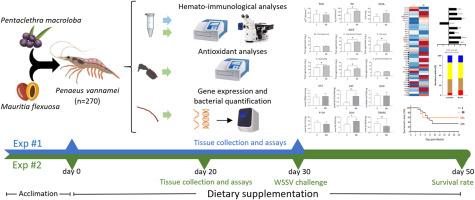amazon buriti和pracaxi作为潜在的功能性饲料添加剂提高对虾对WSSV的免疫力和抗性。
IF 3.9
2区 农林科学
Q1 FISHERIES
引用次数: 0
摘要
环境和营养因素对调节凡纳滨对虾的免疫系统至关重要,特别是在白斑综合征病毒(WSSV)等病毒威胁下。本研究评估了两种亚马逊植物性饲料添加剂——毛里提(毛里沙)和普卡西(大叶戊甲)对对虾免疫能力、氧化平衡和对WSSV抗性的影响。在饲料中分别添加每种成分的4%或8%。服用8%布里提(B8)的组在免疫参数上表现出最一致的改善,包括酚氧化酶活性增强,血清蛋白浓度升高,对海洋细菌病原体的凝集反应更强。相反,饲料中添加鱼油对对虾的生产性能和存活率有负面影响。在WSSV攻击后,饲喂B8饲料的虾的存活率比对照组提高了25%。生化分析显示过氧化氢酶活性增加,还原性谷胱甘肽水平升高,脂质过氧化降低,表明肝胰腺的抗氧化能力增强,氧化应激减少。此外,免疫相关基因(PPAE1、PPAE2、TGII、CAT)和抗病毒效应器(Vago4、Vago5、STING)的表达上调,提示抗菌、氧化还原敏感和干扰素样抗病毒途径被激活。未观察到中肠菌群的显著变化,说明B8制剂的膳食安全性。这些结果表明,在饲料中添加8%的布里蒂麸皮作为一种天然饲料添加剂,可以通过促进免疫恢复力和氧化稳态来增强凡纳滨对虾对WSSV的抵抗力。此外,其可持续生产、符合循环经济原则和蓝色亚马逊倡议,突显了其作为生态友好型水产养殖功能性饲料添加剂的潜力。本文章由计算机程序翻译,如有差异,请以英文原文为准。

Amazonian buriti and pracaxi as potential functional feed additives to improve shrimp immunity and resistance to WSSV
Environmental and nutritional factors are critical in modulating the immune system of Penaeus vannamei, particularly under viral threats such as white spot syndrome virus (WSSV). This study evaluated the effects of two Amazonian plant-based feed additives, buriti (Mauritia flexuosa) and pracaxi (Pentaclethra macroloba) brans, on shrimp immunocompetence, oxidative balance, and resistance to WSSV. Shrimp were fed diets supplemented with 4 % or 8 % of each ingredient. The group receiving 8 % buriti (B8) exhibited the most consistent improvements in immunoparameters, including enhanced phenoloxidase activity, elevated serum protein concentration, and stronger agglutination responses against marine bacterial pathogens. In contrast, pracaxi-supplemented diets negatively affected shrimp performance and survival. Following WSSV challenge, shrimp fed the B8 diet showed a 25 % increase in survival compared to controls. Biochemical analyses revealed increased catalase activity, elevated reduced glutathione levels, and decreased lipid peroxidation, indicating enhanced antioxidant capacity and reduced oxidative stress in the hepatopancreas. Additionally, the expression of immune-related genes (PPAE1, PPAE2, TGII, CAT) and antiviral effectors (Vago4, Vago5, STING) was upregulated, suggesting activation of antimicrobial, redox-sensitive and interferon-like antiviral pathways. No significant changes in midgut bacterial microbiota were observed, the dietary safety of the B8 formulation. These findings demonstrate that dietary inclusion of buriti bran at 8 % emerges as a natural feed additive that enhances WSSV resistance in P. vannamei by promoting immune resilience and oxidative homeostasis. Moreover, its sustainable production and alignment with circular economy principles and the Blue Amazon initiative underscore its potential as a functional feed additive for eco-friendly aquaculture.
求助全文
通过发布文献求助,成功后即可免费获取论文全文。
去求助
来源期刊

Fish & shellfish immunology
农林科学-海洋与淡水生物学
CiteScore
7.50
自引率
19.10%
发文量
750
审稿时长
68 days
期刊介绍:
Fish and Shellfish Immunology rapidly publishes high-quality, peer-refereed contributions in the expanding fields of fish and shellfish immunology. It presents studies on the basic mechanisms of both the specific and non-specific defense systems, the cells, tissues, and humoral factors involved, their dependence on environmental and intrinsic factors, response to pathogens, response to vaccination, and applied studies on the development of specific vaccines for use in the aquaculture industry.
 求助内容:
求助内容: 应助结果提醒方式:
应助结果提醒方式:


